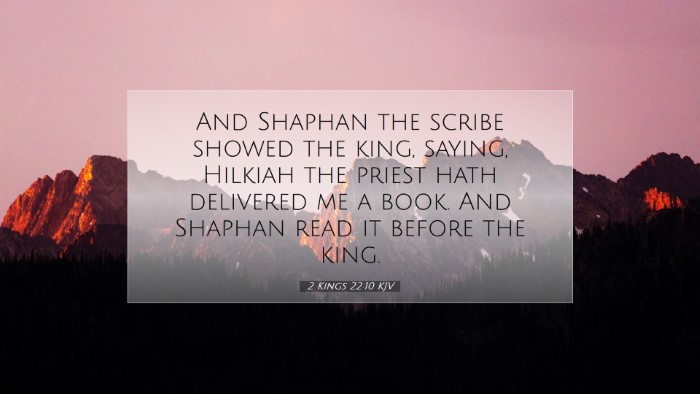Old Testament
Genesis Exodus Leviticus Numbers Deuteronomy Joshua Judges Ruth 1 Samuel 2 Samuel 1 Kings 2 Kings 1 Chronicles 2 Chronicles Ezra Nehemiah Esther Job Psalms Proverbs Ecclesiastes Song of Solomon Isaiah Jeremiah Lamentations Ezekiel Daniel Hosea Joel Amos Obadiah Jonah Micah Nahum Habakkuk Zephaniah Haggai Zechariah Malachi2 Kings 22:10
2 Kings 22:10 KJV
And Shaphan the scribe showed the king, saying, Hilkiah the priest hath delivered me a book. And Shaphan read it before the king.
2 Kings 22:10 Bible Commentary
Commentary on 2 Kings 22:10
Bible Verse: "And Shaphan the scribe told the king, saying, 'Hilkiah the priest hath given me a book.' And Shaphan read it before the king."
Introduction
This verse serves as a critical turning point in the narrative of 2 Kings, marking a significant rediscovery of God’s Law amidst a time of spiritual neglect. The context frames the spiritual landscape of Judah under King Josiah’s reign, illustrating the importance of Scripture in guiding the people back to their covenantal obligations to God. The commentaries provide profound insights on its implications for religious reform and the role of dedicated leaders in sparking revival.
Matthew Henry's Insights
Matthew Henry highlights the consequence of spiritual apathy that preceded this moment. He notes:
- The temple was neglected, revealing a broader neglect of God’s Word.
- Spiritual leaders, like Hilkiah, played a pivotal role in restoring the lost knowledge of the Law.
Henry emphasizes that the book found, identified as the Book of the Law, was likely Deuteronomy or a portion thereof. Its discovery could have shocked the kingdom, as its stipulations were essential for the covenant relationship between God and Israel.
The Role of Shaphan the Scribe
According to Henry, Shaphan's position as scribe was critical. He symbolized communication and conveyance of knowledge from the priesthood and the temple to the monarchy, as stated:
- His act of reading the Law before the king underscored the importance of Scripture being spoken aloud and understood by all leaders.
- Shaphan’s willingness to bring this vital message to the king signifies the responsibility of those in leadership to handle Scripture carefully and reverently.
Albert Barnes's Analyses
Albert Barnes provides a more contextual background. He illustrates:
- The historical context of Judah and the decay in religious observance.
- How the book recovered was instrumental in initiating reforms that Josiah would implement.
Barnes posits that the phrase "Hilkiah the priest hath given me a book" suggests a likely surprise and urgency surrounding the finding of the book, indicating the depth of abandonment concerning the Mosaic law during previous reigns.
The Discovery's Impact
Barnes emphasizes the transformative nature of the Law. He asserts that the revelation of God’s commands could ignite a spiritual revival, stressing that knowledge of God’s Word was paramount for the king and his people.
Call to Spiritual Renewal
This discovery served as a catalyst for reform and called for a return to the covenantal practices that had been neglected. Barnes underlines the necessity for leaders to not only read but also act upon the intricate details of the law.
Adam Clarke's Perspective
Adam Clarke comments on the significance of this passage in light of prophecy and divine judgment. He notes:
- This event is aligned with prophetic warnings against Israel’s disobedience.
- The recovered book reveals both the grace and judgment of God in calling His people back to Himself.
Understanding the Recovering of the Book
Clarke suggests that, at this time, the people had not only forgotten God’s Law but had also lost the knowledge of their true identity as the covenant people. The book was thus not only a legal document but a true reflection of their relationship with God:
- It serves to remind them of their obligations.
- It opens the avenue for redemption and restoration if they are willing to heed its words.
Theological Implications
The discovery of the Book of the Law brings forth several theological themes pertinent for pastors and theologians:
- Obedience to God’s Word: The necessity of reverence to Scripture echoes throughout this passage. It declares that revival begins with rediscovering and adhering to God’s commands.
- Leadership Responsibility: Both Hilkiah and Shaphan exemplify how godly leaders must take action to illuminate God’s guidance in turbulent times.
- Restoration and Reformation: The potential for personal and communal revival through divine revelation is a theological tenet that speaks volumes to present-day ecclesiology.
Conclusion
In conclusion, 2 Kings 22:10 demonstrates a pivotal moment in Israel's history, marked by the rediscovery of God's Law. This event serves as a reminder to contemporary believers about the crucial nature of Scripture in our spiritual lives and the profound impact that dedicated leadership can have in guiding the Church back to its foundational truths. The insights from Matthew Henry, Albert Barnes, and Adam Clarke emphasize the necessity for spiritual diligence, restoration of covenant life, and the transformative power of God's Word in the life of His people.


